The following individuals are considered the top 10 best Swedish soccer players of all time by bestsoccertips.com. The ranking of renowned Swedish footballers is determined by the HPI (Historical Popularity Index), which consolidates data regarding the online prominence of their profiles. Visit the ranking page to see the full list of Swedish football players.
Top 10 best Sweden soccer player
1. Gunnar Nordahl (1921 – 1995)
With an HPI of 68.58, Gunnar Nordahl is the most famous Swedish soccer player. On Wikipedia, his life story has been translated into 48 languages, reflecting its broad international appeal and recognition. Nils Gunnar Nordahl (October 19, 1921 – September 15, 1995) was a Swedish professional footballer. Renowned for his prolific goalscoring ability, formidable physicality and keen scoring instincts. He was most praised during his tenure at AC Milan from 1949 to 1956. During this period, he won the Scudetto twice and set a remarkable record. That is winning the Serie A championship. Winning the Golden Shoe 5 times, an unparalleled achievement in Italian football history.
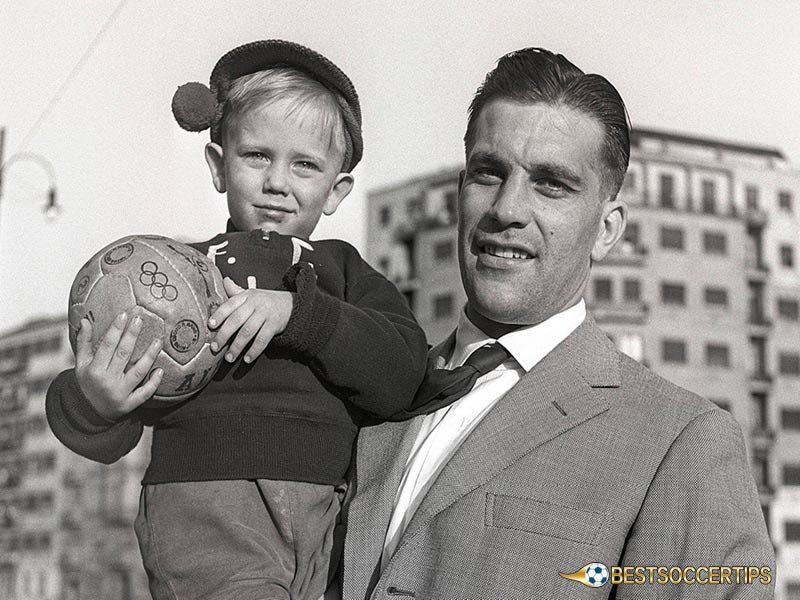
Nordahl holds the title of Milan’s top goalscorer and previously held Serie A’s single-club goal record until Francesco Totti surpassed it in January 2012. He maintains the top goals-per-game ratio in Italy and has earned various nicknames, including “The Gunner,” “The Fireman”, and “The Bison”. Representing Sweden internationally from 1942 to 1948, he earned 33 caps and scored 43 goals. At the 1948 Summer Olympics, he shared the top scorer position with Denmark’s John Hansen as Sweden secured the gold medal. Nordahl is celebrated as one of Sweden’s premier footballers and a legendary goal-scorer. In 2017, FourFourTwo magazine ranked him as the 54th greatest footballer ever. Additionally, he is the father of former footballer Thomas Nordahl.
2. Zlatan Ibrahimović (1981 – )
With an HPI of 67.02, Zlatan Ibrahimović ranks second in the list of famous Swedish soccer players. His life story has been translated into an astonishing 91 languages, showcasing the immense popularity and global impact he holds across diverse cultures and regions.
Zlatan Ibrahimović, born 3 October 1981, is a Swedish retired professional football player. He is famous as a striker. Famous for his exceptional technique, ball control, physical strength and exceptional playing style. Ibrahimović has etched his name in football history. Boasting an impressive collection of 34 career titles. He is honored as one of the best strikers in the history of this sport. Firmly affirming his position among the world’s most prominent football personalities.
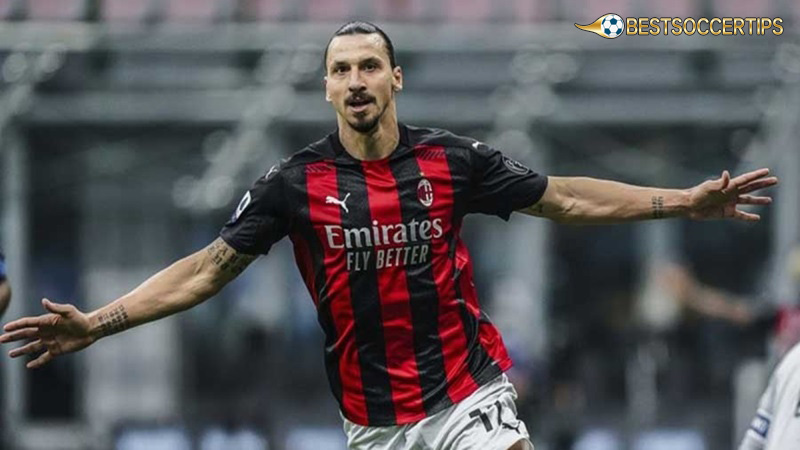
Ibrahimović’s career began at Malmö FF in 1999, followed by successful stints at Ajax, Juventus, Inter Milan, Barcelona, Milan, Paris Saint-Germain, Manchester United, LA Galaxy, and Milan. He dominated several top European leagues and made a significant impact with over 570 goals, including many crucial ones.
Off the field, Ibrahimović has left a profound mark on Swedish football history. He is the all-time leading goalscorer for the Swedish national team with 62 goals and has participated in multiple World Cups and European Championships. He is highly regarded for both his individual talent and strong personality, making him a special and admired figure among football fans.
3. Nils Liedholm (1922 – 2007)
With an HPI of 62.44, Nils Liedholm ranks as the third most famous Swedish football player. His life story has been translated into 41 languages, attesting to its global appeal and widespread recognition. Nils Erik Liedholm (October 8, 1922 – November 5, 2007) was a Swedish football midfielder and coach. Fondly known as Il Barone (The Baron) in Italy, he is famous for being part of the Swedish attacking trio “Gre-No-Li” alongside Gunnar Gren and Gunnar Nordahl at AC Milan and the Swedish national team, achieving notable success throughout his career.
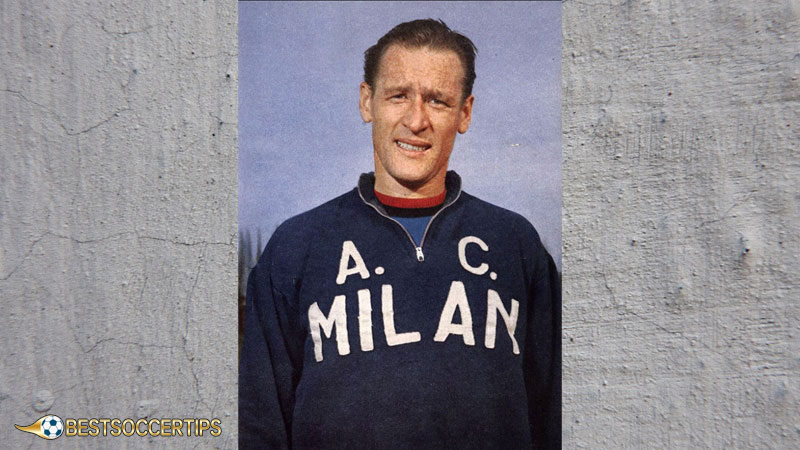
Liedholm was an intelligent and technically gifted attacking player, renowned for his diverse passing ability and elegant playing style. He stands tall among the legends of football, revered not only as a luminary for both Milan and Sweden but also as one of the shining stars of the post-war football era. As the 20th century drew to a close, Liedholm’s exceptional skills on the field garnered widespread acclaim, leading to his selection by the readers of Sweden’s largest newspaper, Aftonbladet, as the nation’s foremost footballer of the century. As a coach, he managed several teams in Italy, overseeing nearly four decades and earning acclaim for his use of zonal marking systems. He is widely acknowledged as one of the most successful managers in the annals of Italian football history.
4. Gunnar Gren (1920 – 1991)
With an HPI of 61.02, Gunnar Gren is the fourth most famous Swedish football player. His biography has been translated into 37 different languages. Johan Gunnar Gren (October 31, 1920 – November 10, 1991) was a professional football player and coach from Sweden, best remembered for his spells with IFK Göteborg and AC Milan. As a creative forward, renowned for his technical skills, vision, tactical intelligence, and passing ability, he was part of the famous “Gre-No-Li” trio at Milan and the Swedish national team.
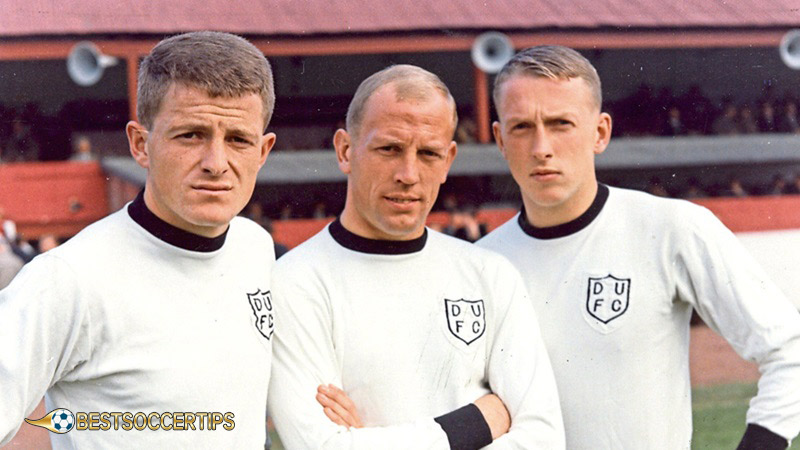
He was also capable of playing as an attacking midfielder, a central midfielder with an attacking inclination, referred to as a mezzala in Italian football terminology, or even as a forward. Representing Sweden internationally from 1940 to 1958, he earned 57 caps and scored 32 goals for the Swedish national team. He was a member of the Swedish team that won the gold medal at the 1948 Summer Olympics and finished as runners-up at the 1958 FIFA World Cup. In 1946, he clinched the prestigious Guldbollen award, a testament to his unparalleled skills and contribution to Swedish football. A statue erected in his honor outside the Gamla Ullevi stadium immortalizes Gren’s legacy as one of Sweden’s premier and most honored footballers, signifying his lasting influence on the sport and the country’s footballing tradition.
5. Kurt Hamrin (1934 – 2024)
With an HPI of 60.00, Kurt Hamrin ranks as the fifth most famous Swedish football player. His life story has been translated into 30 different languages, illustrating its worldwide significance and broad accessibility. Kurt Roland “Kurre” Hamrin (Swedish: November 19, 1934 – February 4, 2024) was a Swedish footballer who played as a winger. He initiated his journey domestically with AIK before venturing into the realm of Italian football, where he left an indelible mark with several renowned clubs, particularly Fiorentina. During his illustrious tenure spanning nine years, he clinched two Coppa Italia trophies, a Cup Winners’ Cup, and a Mitropa Cup, amassing over 350 appearances and netting beyond 200 goals across various competitions for the Viola.
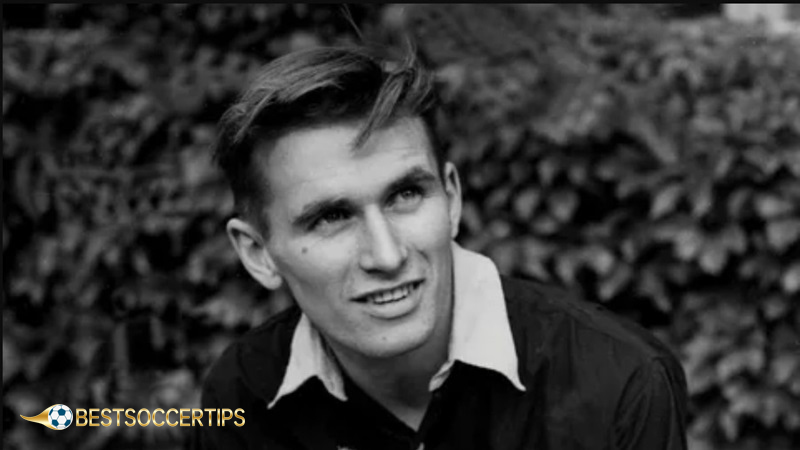
He also represented AC Milan, where he won the Serie A championship and the UEFA Champions League. A prolific goalscorer, he is currently the eighth-highest goalscorer of all time in Serie A with 190 goals. Apart from his achievements at the club level, Hamrin also enjoyed a distinguished international career, representing Sweden in the FIFA World Cup 1958 final, a historic moment on home turf. Revered as one of Sweden’s footballing icons, his legacy extends beyond national borders, earning him accolades as one of Fiorentina’s most revered players in the annals of the club’s history.
6. Henrik Larsson (1971 – )
Henrik Larsson, with an HPI score of 57.57, ranks sixth on the list of famous Swedish football players. His life story has been rendered into 55 different languages, reflecting its widespread international appeal and significance. Born on September 20, 1971, Edward Henrik Larsson is a former footballer and coach from Sweden. He began his career at Högaborgs BK and later moved to Helsingborg IF in 1992. Here, he collaborated with Mats Magnusson to help the club achieve promotion to Allsvenskan after 24 seasons in lower divisions.
Later, Larsson moved to Feyenoord in November 1993, where he won two KNVB Cups before joining Celtic in 1997. At Celtic, he won numerous titles and became a key player, helping the club win league championships and reach the UEFA Cup final.
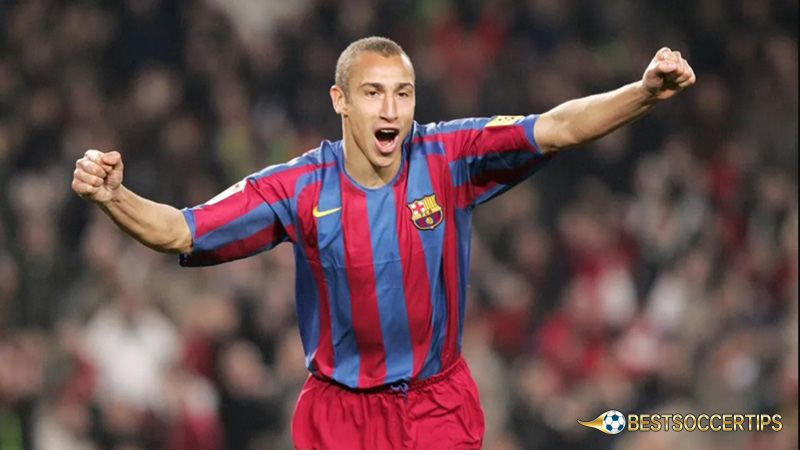
After his time at Celtic, Larsson joined Barcelona in 2004, where he won significant honors like the UEFA Champions League in 2005–06. Afterward, he made a comeback to Helsingborg before embarking on a short loan stint at Manchester United in the early months of 2007.
Larsson ended his international playing career with the Swedish national team, participating in three World Cups and three UEFA European Championships. He accumulated numerous individual honors, most notably the esteemed Golden Ball, solidifying his status as Sweden’s foremost footballer of the past fifty years. Larsson further cemented his legacy by becoming the highest goal scorer in the history of the UEFA Europa League/UEFA Cup.
Following his retirement, Larsson transitioned into coaching and has since managed numerous clubs in Sweden. His managerial stints have included positions at Landskrona BoIS, Falkenberg, and Helsingborg, where his son, Jordan, notably featured as one of his players.
7. Ronnie Hellström (1949 – 2022)
With an HPI of 56.84, Ronnie Hellström ranks as the seventh most famous Swedish football player. His biography has been translated into 24 different languages. Folke Ronnie Wallentin Hellström (February 21, 1949 – February 6, 2022) was a Swedish footballer who played as a goalkeeper. He represented Hammarby IF and 1. FC Kaiserslautern during a career spanning from 1966 to 1984. He is considered one of the premier goalkeepers worldwide throughout the 1970s.
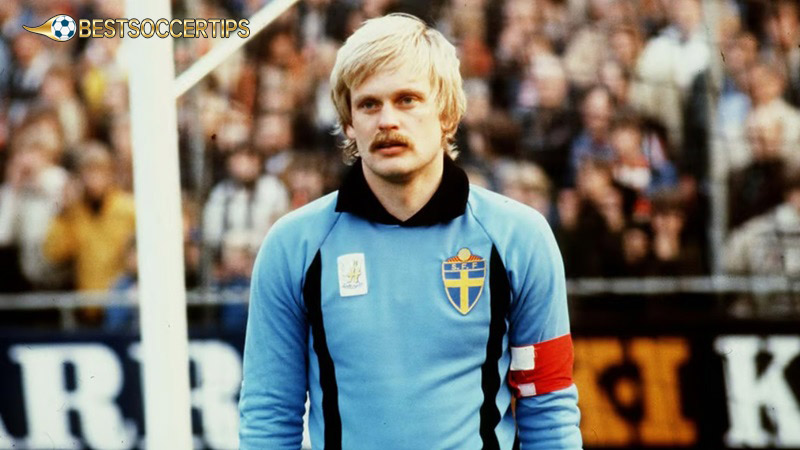
In 1988, he played one match in Allsvenskan for GIF Sundsvall after a crisis of injury. As a full-time international player from 1968 to 1980, he earned 77 caps for the Swedish national team. And represented his country in the 1970, 1974 and 1978 FIFA World Cup tournaments. He received the Guldbollen, Sweden’s highest football award. In both 1971 and 1978. 1978, solidifying his status as the nation’s top football player during those years.
8. Thomas Ravelli (1959 – )
With an HPI score of 55.00, Thomas Ravelli ranks eighth on the list of famous Swedish football players. His life tale has been widely translated into 33 languages, emphasizing the widespread acknowledgment and significant impact he has made across the globe.
August 13, 1959, marked the dawn of football stardom. Thomas Ravelli, whose illustrious career spanned two decades, etched his name in the annals of Swedish football. Famous mainly for his time playing for Öster and Göteborg. Ravelli appeared in a staggering 416 matches at Allsvenskan.
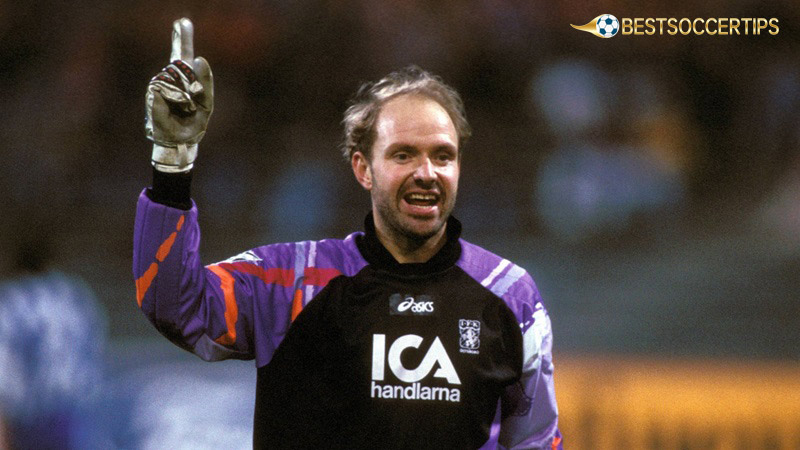
Considered the epitome of Swedish football excellence. Ravelli graced the Swedish national team with his presence during an important era. His indelible journey has seen him represent the national team at two FIFA World Cups, in 1990 and 1994, along with UEFA Euro 1992. However, beyond his role as a national icon , Ravelli’s legacy also serves as a beacon for aspiring footballers across Sweden, shaping their aspirations and charting the course for future generations of talent.
9. Agne Simonsson (1935 – 2020)
With an HPI score of 54.46, Agne Simonsson ranks ninth on the list of famous Swedish football players. His extensive life narrative has been translated into 26 languages, highlighting the wide-reaching impact and global acknowledgment he commands.
Tore Klas Agne Simonsson (October 19, 1935 – September 22, 2020) made her name among the Swedish football elite. He showed his talent as a striker on the field. Beginning his football journey with Örgryte IS in 1953, he rose to fame playing for Real Madrid and Real Sociedad in La Liga during the early 1960s. Returned home victorious against Örgryte in 1963.
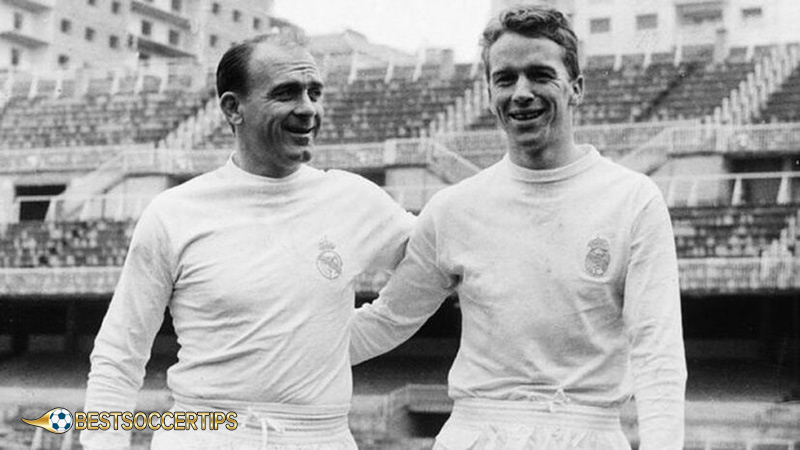
Agne Simonsson appeared in 51 matches for the Swedish national team and contributed to bringing home the silver medal for Sweden at the 1958 FIFA World Cup. In 1959, after an excellent performance in an international match against England at the Stadium Wembley campaign. He received the prestigious Svenska Dagbladet Gold Medal. in recognition of his outstanding achievements. It was one of the remarkable achievements in his career, making Simonsson a figure in Swedish football history.
10. Sven Tumba (1931 – 2011)
With an HPI of 54.20, Sven Tumba is the tenth famous Swedish football player. His biography has been translated into 26 different languages. Sven Tumba (born Sven Olof Gunnar Johansson; August 28, 1931 – October 1, 2011) was one of Sweden’s most prominent ice hockey players in the 1950s and 1960s. He showcased his talents not only in football and golf but also emerged as a Swedish champion in water skiing. Johansson initially embraced the moniker “Tumba” during the 1950s, prompted by the presence of other players sharing his surname, his upbringing rooted in the town of Tumba, Sweden.
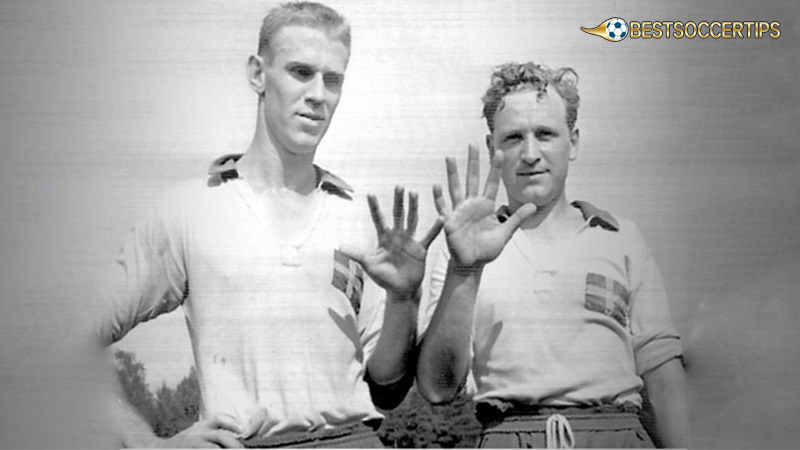
In the cool air of October 1960, he exchanged vows with Mona. And as the years passed, they began the journey of redefining their identities, officially adopting the surname Tumba. Johansson’s extraordinary on-ice achievements have elevated him to a respected status in the annals of hockey history. The culmination was his induction into the prestigious IIHF Hall of Fame in 1997.
Transitioning from ice hockey, he excelled in golf, showcasing his skill and leaving a mark as a course designer. Beyond personal achievements, he promoted golf globally, organizing events and introducing it to new territories like the former Soviet Union.
Conclusion
The vibrant tapestry of Swedish football heritage shines brightly thanks to the remarkable contributions of renowned players such as Ronnie Hellström, Thomas Ravelli, Agne Simonsson, and Sven Tumba, among a host of others. Their stellar performances on the field, both domestically and internationally, have solidified their places as icons of Swedish football. With legendary skills in goalkeeping and prolific goal-scoring abilities, these athletes have etched their names in the annals of the sport, sparking inspiration among generations of athletes not only in Sweden but also worldwide. Their accomplishments stand as proof of the fervor and skill that have elevated Swedish football to a revered status on the international sporting stage.




